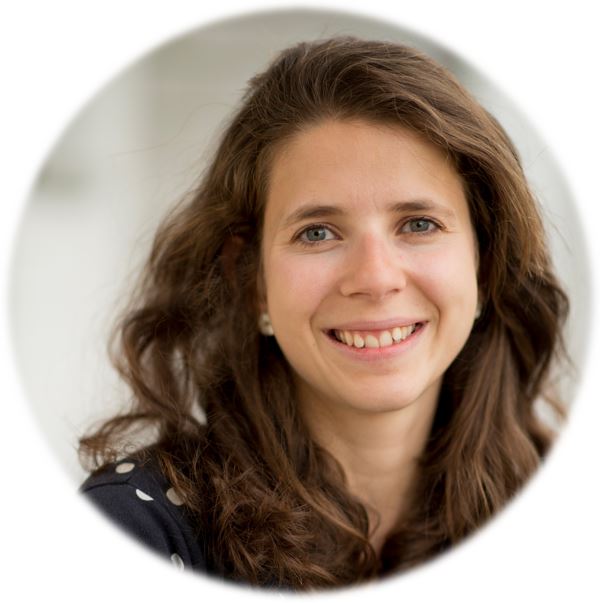What graduates say about ETH biology studies
... about the Bachelor's studies

Juliane, third Bachelor's year
"The third year of study with the large selection of block courses was the decisive reason why I decided to study biology at ETH. In each of the 100 or so block courses on offer, we students have the opportunity to gain a very intensive insight into a wide range of biology topics over a period of almost four weeks. You are often integrated into a research group during the practical work and thus make a personal contribution to important and current projects. Thanks to the block courses, I was able to make many new contacts and get to know everyday life in the laboratory better. It was this experience that made it clear to me where my interests lie and in which direction I want to specialize further."
... about the Master's studies

Fabia, Master's specialization in Molecular and Structural Biology
"The fascination of observing biologically and medically relevant macromolecules at the atomic level, understanding their dynamics and deciphering their function from this led me to choose the Master's specialization in Molecular and Structural Biology. If I were faced with this decision again today, I would make exactly the same decision. The reasons? On the one hand, certainly the incredible variety of methods used in this field. In addition, I experienced a very strong team spirit and positive motivation in the research groups. These two aspects provide an extremely stimulating environment for Master's students, which leaves plenty of scope for the development of new ideas and promotes the independent development of projects."

Dario, Master's specialization in Systems Biology
"For me, the appeal of doing a Master's in systems biology lies in the interdisciplinary nature of this specialization. It combines biological issues with areas of mathematics, statistics and computer science. I found learning new methods and techniques and the exchange with other disciplines extremely exciting and enriching. The work during my semester projects combined conducting my own experiments with data analysis and mathematical modeling. This makes the projects very varied. I also find the interaction between experiment and model interesting, as new hypotheses from the modeling can be tested immediately. I am sure that the techniques of systems biology can be used in many areas of biology to investigate complex biological processes."

Karina, Master's specialization in Microbiology
"My fascination for the enormous variety of survival strategies of microorganisms in the most complex habitats and the dormant potential for applications in disease control and biotechnology were the reasons why I chose the Microbiology / Immunology Master's program. The various sub-areas in microbiology make it possible to get to know a wide variety of techniques and to exchange ideas with other disciplines. As part of my project work, I was able to gain a good insight into the individual research groups and deal with the respective problems. The impressions and insights gained from this provide an ideal and broad basis for further work in this field."

Christopher, Master's specialization in Molecular Health Sciences
"At some point, it became clear to me that I wanted to dedicate myself to research in an area where tangibility and clinical potential are always at the forefront. In order to be able to look at the human organism as a whole, you have to learn to move in a very aspect-rich field and to question and rethink established concepts. If you want to tackle the everyday problems of the modern healthcare system, you have to be able to develop very practical solutions. The multifaceted problems that present themselves in this area can only be solved in an interdisciplinary manner by combining natural science and technically skilled engineering. 'Broaden your horizons and rise to the challenge' - with this motto, I am in the right place in my Master's specialization."

Roxane, Master's specialization in Ecology and Evolution
"In the Master specialisation of Ecology and Evolution I have found the area of biology that suits me best and in which I can develop best. The block courses were extremely exciting and varied and have further enhanced my great enthusiasm for the incredible diversity of the plant, fungal and animal world. Furthermore, their structure and the implementation in small groups guaranteed efficient and sustainable learning. The two research projects were pointing the way forward to the Master thesis, which I finally decided on. For me, a great dream has thus come true: a mixture of laboratory and field work integrated in a large, nationwide project. I hope that with my work I will be able to contribute to the further development of amphibian conservation."

Camilla, Master's specialization in Molecular Plant Biology
"Food sources, raw materials, nature experiences, oxygen production - plants play a number of indispensable roles for us humans. The construction of organic molecules from inanimate material with the help of sunlight - this ability of plants holds a fascination for me that led me to choose the Master's in Plant Biology. How do plants manage to adapt their build-up and breakdown of reserves so precisely and quickly to changing day and night rhythms? What processes take place at the molecular level? These questions took me to the John Innes Center in Norwich, England, as part of my second project. It was a unique opportunity to get to know a research facility abroad. Plant biology offers the opportunity to get to know a broad spectrum of molecular methods and to work with the latest techniques."

Carmen, Master's specialization in Biochemistry
"The Master's in Biochemistry offers me exactly the right thematic and technical diversity that I was looking for in order to acquire as many different skills as possible and gain a wide range of experience. I find it fascinating that you bring together several experimental approaches to the same biological problem in order to finally combine the individual parts into a big whole. I particularly like the fact that the work is very interdisciplinary and that the exchange and communication of scientific knowledge and data are central aspects. During the one and a half years of the Biochemistry Master's program, I have the opportunity to come into contact with various model organisms such as yeast, bacteria, human cell lines and viruses. This allows me to get to know a variety of methods. From a simple PCR to various applications of microscopy and state-of-the-art mass spectrometry to computer-based data analysis, everything is included."

Raphael, Master's specialization in Biological Chemistry
"If you want to know more about the chemical and molecular principles that determine the structure of life, biological chemistry is the right place for you. I am fascinated by the subject because it deals with the function, production and modification of all biological building blocks, from low-molecular compounds to macromolecules. Accordingly, the range of lectures is broad and has enabled me to specialize in organic chemistry, enzymology and structural biology, among other things. During the semester projects in synthetic organic chemistry and protein engineering, I particularly appreciated the fact that I was actively involved in planning the experiments. I became familiar with the various techniques and now have a better understanding of how creative and challenging research ideas at the interface between biology and chemistry are implemented."